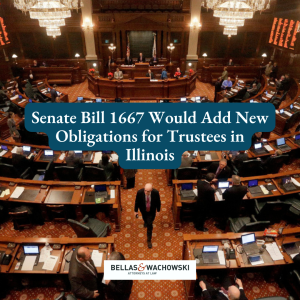 A new bill, Senate Bill 1667, has been sent to the Governor’s desk and could soon bring meaningful updates to the Illinois Trust Code. If signed into law, this legislation would create additional obligations for trustees, especially regarding document retention and the recovery of unclaimed trust assets. These proposed changes reflect a broader movement to modernize trust administration and promote long-term accountability.
A new bill, Senate Bill 1667, has been sent to the Governor’s desk and could soon bring meaningful updates to the Illinois Trust Code. If signed into law, this legislation would create additional obligations for trustees, especially regarding document retention and the recovery of unclaimed trust assets. These proposed changes reflect a broader movement to modernize trust administration and promote long-term accountability.
At the heart of the bill are two key provisions. First, trustees would be required to keep a copy of the trust instrument for a minimum of seven years after the trust has terminated. This post-termination retention period helps preserve essential records that could become critical in the event of future questions, disputes, or beneficiary claims. Second, trustees would be obligated to conduct a reasonable search for any trust property that has been reported to the Illinois State Treasurer as unclaimed. This requirement is designed to ensure that assets do not slip through the cracks or go unclaimed due to administrative oversight.
Together, these changes aim to enhance transparency, reduce the likelihood of lost or forgotten property, and protect the interests of beneficiaries even after the trust’s formal duties have ended. As trust assets become increasingly diverse, and as more accounts
and investments go digital, these obligations reflect the need for continued diligence well beyond the final distribution.
Trustees should take particular note of this bill because it emphasizes the ongoing nature of their responsibilities. Even after a trust has been fully distributed, the duty to maintain records and locate unclaimed assets doesn’t automatically end. The law would
codify that trustees must preserve key information and take active steps to identify assets that may have been turned over to the state. This could include items such as dormant bank accounts, long-forgotten stock holdings, or digital assets that were not
included in final accountings.
As of now, the Governor has a limited window to sign or veto the bill. If no action is taken within the designated period, and the General Assembly remains out of session, the bill will be automatically vetoed. Trustees, estate attorneys, and fiduciaries should
begin thinking about how these changes might affect their administrative practices, particularly in how trust documents are archived and how property flagged as unclaimed is monitored.
If you are a trustee or manage a trust and want to ensure your practices comply with current and upcoming legal standards, contact Bellas & Wachowski Attorneys at Law at (847) 823-9030 for personalized guidance on trust administration and estate
planning.
 Chicago Business Attorney Blog
Chicago Business Attorney Blog

